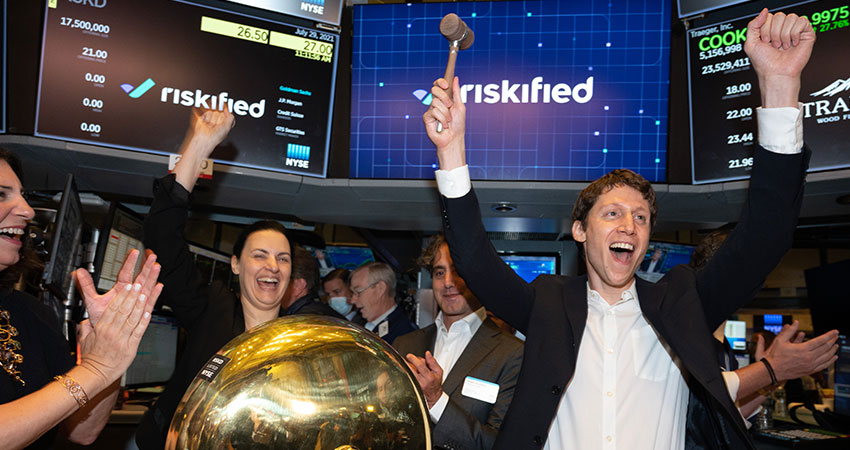Riskified CEO Eido Gal and team celebrate the first trade of their stock on IPO day at the NYSE (credit: CRC Media)
Ecommerce fraud prevention company Riskified has taken the major step into the public markets, launching an IPO today at $21 a share on the New York Stock Exchange as it looks to expand in Asia-Pacific, Latin America and western Europe and improve its technology for keeping bad actors out.
Prior to the IPO, Riskified had raised $220 million from investors including General Atlantic, Fidelity Management & Research, Winslow Capital, Genesis Partners, Pitango and Qumra Capital.
“It’s extremely exciting for us, at this point in time in our journey” said Pete Elmgren, Chief Revenue Officer of Riskified. “We’re in it for the long haul, making sure we continue to solve ecommerce fraud for our merchants, and make it safe, accessible and frictionless for them and their customers.”
Riskified, which counts Wayfair, Live Nation, Prada, GymShark, Peloton and Finish Line among its customers, had a pre-IPO valuation of $3 billion. It focuses on prevention of Account Take Over (ATO), policy abuse such as refunds and discounts, chargeback abuse and malicious login attempts by bots and humans. Riskified was founded in Israel in 2013 by Eido Gal and Assaf Feldman, with its main office in New York.
Top verticals for Riskified are retail, apparel and fashion, travel, luxury and jewelry, consumer electronics and consumer goods. Main competitors include Kount, Sift, Signifyd and ClearSale.
The company said its platform reviews, approves and guarantees transactions that might otherwise be declined, increases bank authorization rates, protects customer accounts and allows merchants to offer shoppers alternate payment methods. According to its F-1 filing with the SEC, Riskified employs 650, had 2020 revenue of $169.7 million, up 30%, and handled $60 billion in GMV last year.
Elmgren said Riskified takes a “flywheel” approach to fraud prevention, using machine learning to help the platform get smarter as more data is fed in from new customers, thus improving the performance and attracting new business.
And fraud management is extremely critical at a time when malicious behavior is soaring along with ecommerce growth as bad actors become more opportunistic in the post-pandemic era. According to eMarketer, global ecommerce is expected to grow from $4.3 trillion in 2020 to approximately $6.4 trillion by 2024.
“By leveraging machine learning, we’ve developed a risk management platform that looks for legitimate as well as fraudulent purchasers,” he said. “Our focus ultimately is eliminating risk for merchants, in so doing driving higher ROI for them and creating sales. We collect as much data as possible across industries, giving it greater predictive power.”

